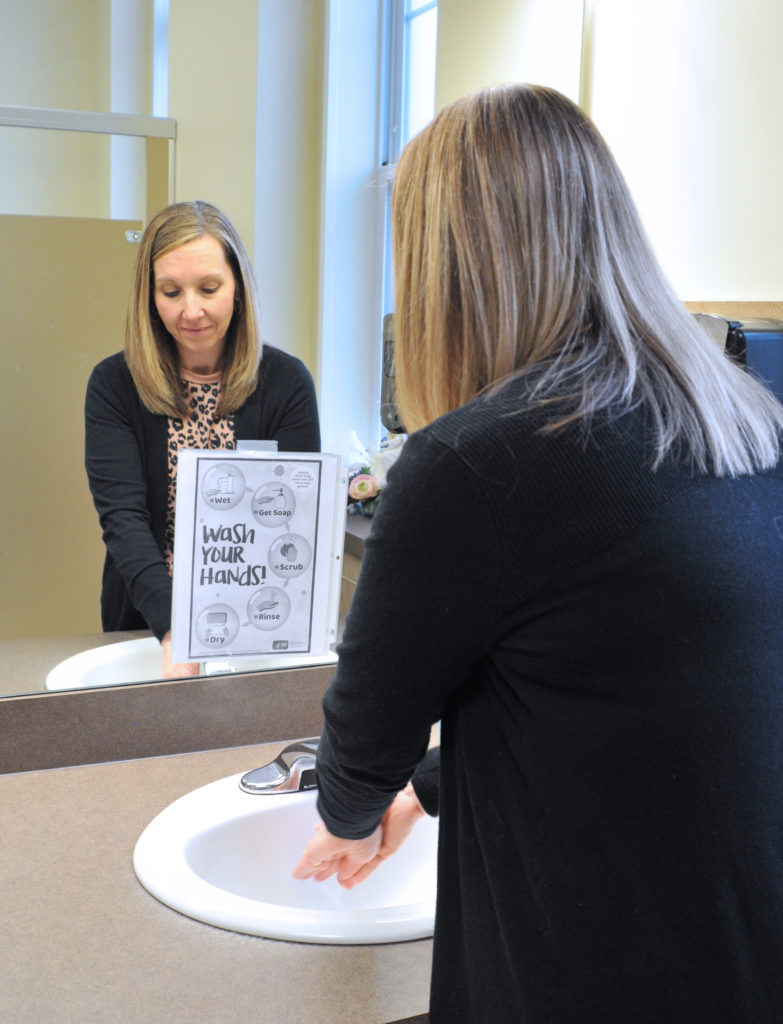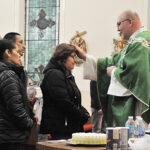The Diocese of Davenport is sharing responses to questions about the COVID-19 virus for your information. Updates will be sent regularly and also posted on the flu page of the diocesan website: https://www.davenportdiocese.org/flu
Q: What should we do at this point about social gatherings at church? I assume we will not have hospitality (coffee and cookies) after Mass? What about our Lenten soup suppers? Fish fries?
We are currently at STEP TWO in our policy. We are NOT moving to STEP THREE yet.

This is a rapidly changing situation; therefore, advice may also change with new information.
The current step in our pandemic policy does not call for an automatic cancellation of such gatherings, and public health authorities have not called for such. Of course, the usual precautions (the “Three C’s”) would apply: Cover, Clean, Contain.
Covering coughs appropriately, careful and regular handwashing, and staying home if you are sick are the most important steps that we can take. Those with flu-like symptoms (fever, cough, sore throat, trouble breathing, and the like) you stay home and call your health care provider for advice.
As in all occasions where food is served, safe handling practices must be followed: hand-washing, the use of gloves and serving utensils, keeping hot foods hot and cold foods cold, etc.
At the same time, pastors need to make prudent decisions regarding their specific situations. Pastors may want to cancel such gatherings if:
– They are not essential to parish life and can be postponed.
– Most of the participants would be at “high-risk” for severe COVID-19 (the elderly and the medically-frail).
– There would be more than 250 persons in attendance.
– Participants would be in very close quarters (ideally, everyone should always be at least 6’ apart).
Even if not cancelling events at this time, parishes should be preparing to do so.
Q: Are we cancelling Lenten communal penance services?
Step Two of our policy does not call for the cancellation of liturgies, whether Mass or Communal Reconciliation. Public health authorities have not called for the blanket cancellation of such gatherings either.
At the same time, it is not required that a communal celebration of the Sacrament of Penance must be offered. Deaneries may instead choose, in these circumstances, simply to have an open time for individual Confession so people can come and go—or even to leave the celebration of the Sacrament up to individual parishes. Regardless of the option, make sure that tissues and hand-sanitizer are available, and that sufficient distance is kept between priest and penitent (at least 6’). Those who are ill should stay home.
Parishes should be preparing for the possibility that greater efforts at social distancing will be called for—including seating people further apart at Mass or even cancelling liturgies altogether (these are part of STEPS THREE and FOUR, which are NOT being implemented yet).
Q. Do I have to go to Mass now that a pandemic has been declared?
We need to remember that if it is not possible to come to Mass, we are dispensed of that obligation. Being ill, or caring for someone who is ill, and being at risk for serious disease if you do go to Mass (or of bringing that disease back home to a family member at risk) are all situations where you have no obligation to attend Mass. Join the Church in prayer from home by, for example, watching a televised Mass or reading the day’s Mass readings as a family.
If Masses have to be cancelled, then, of course, everyone is dispensed of the obligation.
Q. What should we be doing with our fonts and holy water stoups? What if we have an immersion font?
We are advising the following at this point:
The viruses that cause the flu and COVID-19 are sensitive to chlorine. According to the latest information, if local drinking water is chlorinated at the recommended level (0.5 ppm), which is enough to kill these viruses. (Swimming pools keep the level at 1.0 ppm.)
Therefore, immersion fonts with circulating water are OK to use.
Because these are frequently touched, the surfaces around an immersion font are to be cleaned and disinfected after each liturgy and at least daily.
Please check your systems to make sure that it includes a filter and that your local water is chlorinated to the proper level. If local water is not chlorinated to the recommended value, the system itself must have its own method of disinfection built in (chemical or UV light). If not, then the font should be emptied.
All other fonts and holy water stoups are to be emptied at this time. If a baptism is to be celebrated, fresh water is to be used and then the font emptied again. If parishes wish to make holy water available to their parishioners, then small bottles for individual use should be provided.
Why are we making all these changes? Isn’t this just a mild flu for most people?
For most, COVID-19 will be a mild disease. But the problem is this: with a new virus, no one is immune. That means a lot of people will get sick. Of those, a certain percentage… 20% by latest estimates… will have more severe disease. Those at highest risk are the elderly and the medically frail. With a lot of people getting sick, our hospitals, ERs, and clinics will be stressed. They are already facing issues of shortages of critical supplies. So, when it comes to adjusting our lives – even the kind of disruption that the closing of schools and cancelling of gatherings might bring – we do so to slow down the epidemic, spreading it out over time so fewer people are sick all at once. We’re used to thinking about individuals: most of us aren’t going to get too sick. But we also need to think about our society as a whole, and the risk to our health care system. After all, if we have an accident, heart attack, or stroke, we are going to want to be able to get timely care. If COVID-19 has overrun our system, then we will all suffer.
The Scrutinies are required as part of the Elect’s preparation for the Easter Sacraments. What can we do if we can’t celebrate them?
First, in this time of public health concern, Bishop Zinkula has dispensed all Elect – if necessary – in the Diocese of Davenport from one scrutiny, or, “in extraordinary circumstances”, even from two, at the pastor’s discretion. (cf. RCIA 34, 331).
Second, here is a link to TeamRCIA’s video on the Scrutinies and Presentations during this time https://www.youtube.com/watch?v=kiEYtQxrsag
Should we receive different advice from public health authorities, we will pass it along.











